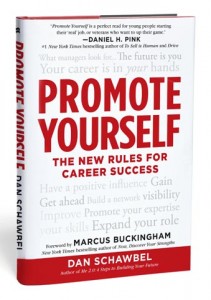Promote Yourself
September 5, 2013
 When I first heard the title of Dan Schawbel‘s new book — Promote Yourself (The actual full title is Promote Yourself: The New Rules for Career Success) I thought, uh oh…another how to use social media to get in the spotlight book. But knowing Dan, I should have known better.
When I first heard the title of Dan Schawbel‘s new book — Promote Yourself (The actual full title is Promote Yourself: The New Rules for Career Success) I thought, uh oh…another how to use social media to get in the spotlight book. But knowing Dan, I should have known better.
Instead of a re-tread on an already tired topic, Dan’s very fresh message is “Hey Millennial — the future is yours if you want it — but don’t think it’s going to get handed to you.” He then outlines how these young professionals need to take charge of their career and make sure “the future has your name on it.”
He encourages his readers (and honestly while his advice is aimed at those born between 1982 – 1993, it’s perfectly applicable to professionals of all ages) to rely on a mix of technical, interpersonal and social media skills. He suggests, and I believe he’s correct, that it’s the hard skills that will get you the job but the soft or interpersonal skills that will get you the promotion.
He says “Hard skills are what will help you navigate the technical elements of your job, but it’s soft skills that will enable you to move ahead.”
Keep in mind that in today’s corporate world, company culture and company ethics are getting more and more important. Skills like being a good communicator, trustworthy and empathetic matter. Especially when sizing up candidates for a possible promotion. When everyone you’re competing with has the same hard skills are you do — how are you going to stand out?
Dan offers up six rules of self promotion that everyone should jot down:
- Make yourself worth being talked about
- Be well-known for one specific thing
- Take responsibility
- Find ways to expand your role
- Make others look good – especially your manager
- Get some evangelists
I am hardly a millennial. And I’ve been in the workplace for a very long time and at this point, I’m the only one who can promote me. But Dan’s book had some great reminders for me too. Whether you’re 20 or been on the job for 20 years — this is a worthwhile read. (click here to buy the book on Amazon*)
As I always try to do — I asked Dan my book author questions and here’s what he had to say:
If you had to describe the content of your book in a single sentence (no run ons) what would it be?
A book that pushes people to be accountable for their own careers and take charge of their lives.
What one book that you’ve read do you wish you could claim as your own?
Give and Take: A Revolutionary Approach to Success by Adam M. Grant.
In your opinion, what is the one trait that all uber successful business people possess?
They are willing to put the effort every single day in order to turn their dreams into reality.
What’s the biggest business mistake you’ve ever made and what did you learn from it?
The biggest mistake I’ve made was that I rushed into trying to get a second book deal after the first one came out. I learned that I need to be more patient and to not only think bigger, but take the time to make something even more successful before I jump into a new project.
Why did you have to write this book? What truth or insight was missing from the human consciousness — that you’ve now answered?
The question I answered in this book is “how do I get ahead at work?” When I started writing it, the idea was it would contain the feedback that employees didn’t receive at work, straight from the managers who have the power to promote them or not.
After someone is done reading your book — what do you hope they do as a result?
I hope they take at least one recommendation in the book and act on it. It would be great to see a revival of work ethic out there and for more people to take risks in their careers.


 That’s the age-old question, isn’t it?
That’s the age-old question, isn’t it?
